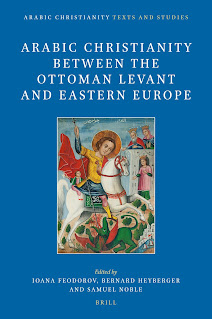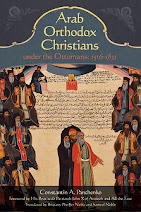Arabic original here.
Holiness and Sainthood: Fr Elias Morcos
A saint isn't someone without sin. So he is not a "good person". The Teacher already affirmed that no one is good except for God! A saint is a repentant sinner. In repentance, there are two fundamental things:
A repentant person is someone who is aware of and knows his sin, not only those that he previously committed, but also those that he is committing now. This means that sin is not limited to a certain act, a certain idea, or even disobedience to a certain commandment. Sin is a continuous existential state. Man lives in sin so long as he does not live in love! Of course, sins can appear in deviant behavior, a stray thought, a distorted sense or things like this.
But what does it mean for sin to be a continuous existential state? The inner being is the heart. It is man's central point. It is what makes a person himself. It is you. It is yourself. Your identity is present in it. It is your spirit. It is the deepest thing in you, out of which your intention and all your purposes come, what defines your goals, to which everything returns, as though it squeezes out the sap of everything that comes to you, with or without your awareness. Thus the focus of the light within you is the existential state that you are in.
Sin, as a constant existential state, exposes that God's love is not within you. Perhaps it does not expose you in front of people, but it exposes you in front of your Lord, first and last. Despite this, if I ask, existentially, "What is my sin?," you have the only true answer: there is no love in me! I do not mean by this that I do not love, but that God's love "is not in me" so that I may love with God's love. And if I do not love with God's love, then my love-- if I claim it-- is for myself and from myself and thus is a shortcoming.
But how can I discern whether my love is from God or from myself?
So long as my love is from myself, I feel as though I have achieved my goal and come to be without sin. But if my love is from God, I experience in the deepest and most painful way what sin is. Sin appears to me as harm to the beloved! My sin, whether yesterday or now, is set up before me, at every time and in every situation. Or, in the words of the Prophet David, "My sin is always before me." It is only within this framework that the reality of the Chosen Apostle Paul's words may be understood: "Christ Jesus came into the world to save sinners, of whom I am first" (1 Timothy 1:15).
It is worth pointing out that the recollection of sin does not stop with forgiveness, but becomes more painful the more one grows in the love of God. Nothing is more painful than to wound the beloved! This, by your Lord's dispensation, is so that one will not forget his sin, so he will not return to it. God forgives, of course, but He does not forget and He does not want us to forget... for our own good!
The second fundamental thing with regard repentance is that repentance is more than return from sin, whatever that sin may be. Repentance is a constant path in which one seeks God's love in obedience. One does not seek only to repent, but all the more so, one seeks to be repentant. If one sins, one returns from his sin. But if one is repentant, then he constantly seeks love as his own breath.
How can obedience in the relationship with God make love grow? Obedience is the path of effacement for the sake of the beloved, so that he may appear within us. Not my will, but thy will! This is the mystery of perfect existence in perfect self-concealment. Your face, O Lord, I seek! My existence comes to be in you, not in myself. You become the object of my desire. It is you that I seek. This is the mystery of God! The mystery of love! The mystery of His being love! The mystery of the Holy Trinity! Man was created to be an icon of this mystery. Therefore, obedience is greater, in a certain sense, than love. Not love as existence that creates, but love as an unseen existence, completely hidden, in which you seek not yourself, but Him, your Lord. If this were not the case, then "Life for me is Christ" would not mean that obedience is the desire for unity in the Spirit. Not for Christ or in Christ, but Christ Himself! "I in them and You in Me... just as You, O Father, are in Me and I in You."
Obedience in sin is subservience, estrangement, dominance, oppression, something repulsive! While obedience in love is something else entirely: trust, certainty, surrender, and then peace, joy, the realization of existence and eternal life.
So a saint is a model of repentance!
Is Fr Elias (Morcos) a saint in this sense?
Canonically, this is in principle declared by the Holy Synod of Antioch. And this is the tradition as it has come down to us.
Nevertheless, in the deep sense of holiness, without the slightest doubt Fr Elias is a saint.
Four things bear witness to his repentance: his tears, his prayer, his poverty and his love. Assuredly, his tears permeated everything. He acquired them through struggle and toil, through putting his sin and shortcoming before himself at all times, through putting himself below others, forcefully, and then, through his persistence! It does not escape me that he acquired him first of all by God's grace. It is no exaggeration to say that no one crosses the threshold of the kingdom without tears. These are not the tears of emotions or what belongs to the soul and body. These are existential tears. The deep inner heart is in pain: for oneself, for others, for God Himself because we do not love Him enough! For His love, for His kindness, for His gentleness. One who does not cry for God does not know Him!
Among the sayings of St Isaac the Syrian: "He who is able to weep for himself for an hour is greater than one who teaches the entire universe. And he who discerns the depth of his infirmities is greater than one who beholds the angels."
Fr Elias wept as he breathed. He stood at prayer and tears welled up. They flowed quietly. He heard of someone's pain and wept. Like this, automatically. Spontaneously. Without effort. With ease, his heart ached.
He would laugh, joke, chat and play like children then, after a few moments, if he stood to pray or if someone asked him to pray for them, he would find himself in a different existential state and would weep. Strange! His tears were always present. Like something normal in his daily habits. He would appear like everyone and at the same time it was as though, in his being, he was easily moved on another level, steadily, like someone who had no connection to what was around him.
And what should I say about his prayer? His tears revealed the identity of his prayer. He prayed like someone going out from the world into the world. Prayer was always his desired dwelling-place. He was aware that a son of Adam is called to become an instrument of prayer. His concern was not with the form of the prayer, but with standing, in the heart, before the Most High. For him, being a monk is for praying. Prayer was the groundwater of all reading, writing, working, thinking, sowing, building and relationship that he undertook. He wept to pray and prayed to weep. The value of everything that came or was brought to him was for it to be a source of prayer and a scope for prayer. Therefore, his eye was not on anything but to abide in God's eye.
If I had to talk about his poverty, I would say one thing about it: According to him, wherever there was a trace of a possession, there was no place for a monk or for God in his heart. His ragged sock stayed ragged for years. As for the broken chair and the shaky table, he did not think to repair them and was not even feel that there was anything strange about them being in the condition they were in. Nothing here was what he was seeking. "Your face, O Lord, I seek." He accepted everything with its faults and didn't pay attention. According to the image of his Teacher, he wanted to be: "You are of this world but I am not of this world." He accepted. He didn't seek anything. He was content with everything. When he was given, he took. If he was not given, he did not seek. He gave. Things were asked of him or were not asked of him. A little or a lot had the same value for him. Poverty, with him, is concealed by silence. It is not an object of study, but an ordinary part of life with God.
And his love? His heart broke over people's pain, suffering and hardship. In contrast to the monastic way of life, he sought to visit and console people. He would go from house to house. Friendship for him was a holy obligation. He did not avoid what other people considered to be an annoyance. His prayer motivated him to be with people, not to avoid people. The time, for him, was a time of suffering and people need consolation.
Fr Elias was a monk, but not necessarily like other monks in his style. He combined strictness in how he treated himself with compassion for people and animals. He was free in his conscience, easy in his affections. He was not harsh with anyone. He was very merciful. He did not burden anyone by causing him to feel sin. His purpose was to lighten people's loads.
Most of what Fr Elias taught me is that the Lord is near and that it is always possible for you to start anew. But let know one injure the beloved! The pain of sin is in its seed. Your Lord weeps for you! The important thing, O servant, is not to hurt yourself.
Fr Elias was an outstanding teacher, a school of the heart. Therefore, he appeared in my eyes as the image of Antioch, formed by the convolutions of these lands.
Do not forget us, Abouna Elias, even if we have forgotten you! Your prayer is our provision.
Archimandrite Touma (Bitar)
Abbot of the Monastery of St Silouan the Athonite-- Douma, Lebanon
Sunday, July 30, 2023







